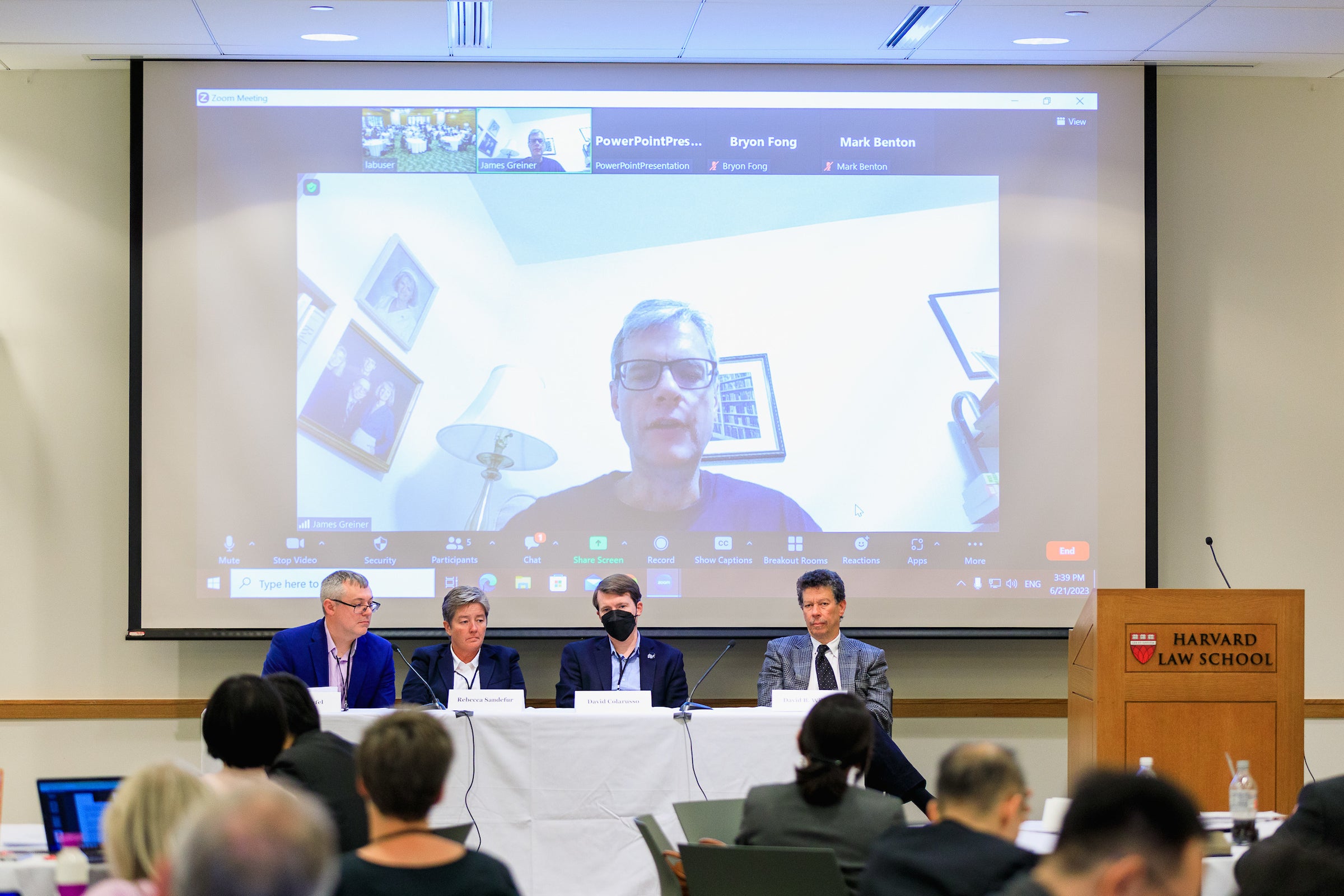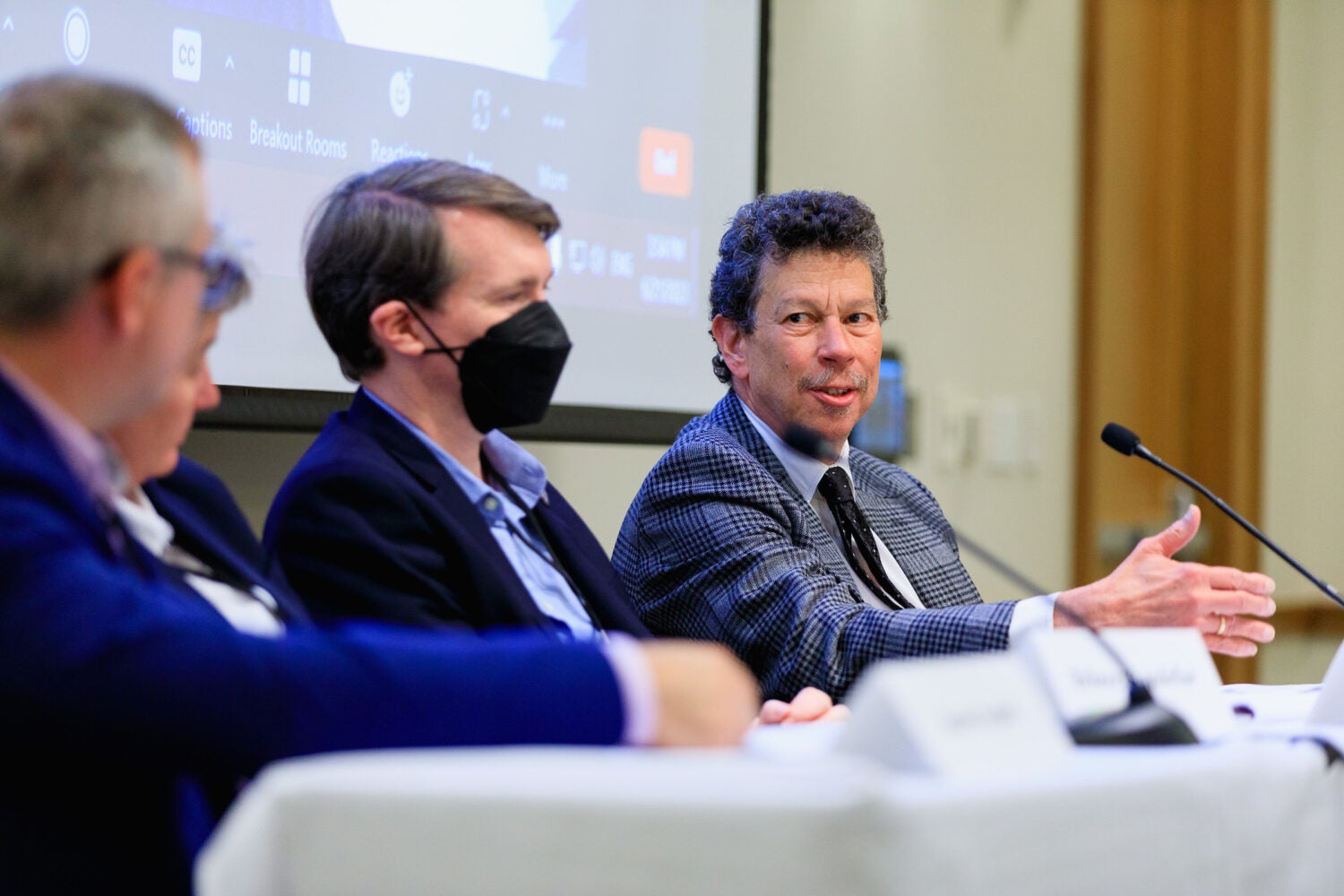Access to justice is now seeing a “Humpty Dumpty” moment, as Harvard Law School Professor David Wilkins characterized it last week: With the arrival of new technologies, the system has cracked into pieces, and nobody seems certain how to put it together again.
“Access to justice is part of a larger transformation that is sweeping over the entire legal profession and indeed the entire economy,” he said. “There has been a rise in the speed and sophistication of information and technology, and a blurring of traditional categories of organization and thought. All of this is providing disruption in the market for legal services. And this disruption is about to explode.”
Wilkins, the faculty director of Harvard Law’s Center on the Legal Profession, made his remarks last week during a panel he moderated, “Measuring Access to Justice,” as part of the International Legal Aid Group conference which the center co-hosted. The ILAG is a network of legal aid specialists that aims to improve evidence-based policymaking in the field of poverty legal services. This year’s event took place at Harvard between June 21 and 23 and focused on contemporary access to justice challenges.
“We have an enormous gap in access of legal services,” Wilkins said. “We know that we will never have enough lawyers to solve the problem. And by privileging lawyers, we often denigrate what is being provided by people who are not lawyers, because [we think] it could not possibly be as good. We often call them ‘alternative legal service providers.’ But as lawyers, we often overlook what the clients need. And this debate we’re having is part of a much larger transformation in how we think about law and what it means to society.”

The larger transformation, he said, is about technology — particularly the rise of ChatGPT. Wilkins noted that the chatbot that burst onto the scene just four months ago has now proven capable of passing a bar exam and is being adopted by many of the world’s most prestigious law firms. Microsoft, he said, just put $14 billion into the app, and is now bundling it with its Bing! search engine — “the one you all deleted from your computer as soon as you got it.”
Despite its rapid spread, the new technology is not without flaws. Wilkins recounted how he’d recently asked ChatGPT about the most famous economic paper of all time. He then displayed its response for the audience: a convincing summary of a paper that didn’t exist. This, he said, makes it crucial to measure the quality of legal information, and there is currently no tool for that.
“We’ve had a lot of information asymmetry,” Wilkins said. “We can wear a wig and mumble Latin, and such things have enabled lawyers to avoid quality review.”
“We’ve had a lot of information asymmetry. We can wear a wig and mumble Latin, and such things have enabled lawyers to avoid quality review.”
David Wilkins, faculty director of the Center on the Legal Profession
The new goal, he said, should be transitioning from a world where knowledge resides exclusively in the heads of lawyers, to one where data can be shared. And this, he said, opens several larger questions. “If we can turn disruptive innovation into access, how do we get people to collaborate? How do we preserve law as a public profession dedicated to public good? And don’t let law schools off the hook: How do we prepare them for a world in which ChatGPT isn’t going away?”
The panelists each examined those questions from a different angle. Rebecca Sandefur of Arizona State University noted that more legal information is now available to people outside the profession, and this has already had concrete results — notably in the resolution of eBay customer disputes. She also noted an app now being used in New York, JustFix, which resolves tenant/landlord issues. In the past, she said, legal aid has often failed to preserve housing for low-income tenants facing eviction.
“We have seen online dispute resolution in a range of commercial transactions,” Sandefur said. “Legal technology is replacing those sad associates in Phoenix who were working in hot warehouses.”
“How do we prepare [law schools] for a world in which ChatGPT isn’t going away?”
David Wilkins
David Colarusso of Suffolk Law School recalled a legal crisis he once worked on: A state chemist had tampered with evidence in drug cases, leading to many improper convictions. “We were asked to find every case this person had touched, and there is no magic button that the DA’s office could press to do that.”
The availability of more data, he said, could prevent such situations in the future. “What we need to do is work better as a community. We need to be better stewards of the data that comes across our desks. And we need to communicate with people building those tools.”
Speaking via Zoom, Professor Jim Greiner gave an update on the Access to Justice Lab at Harvard Law School, which has taken the innovative step of using randomized control trials, or RCT’s, to address the question of who receives legal aid and how much difference it ultimately makes. He said that the work is still very much in progress, but that the question is still a pressing one.
“The traditional attorney-client relationship has been shown to improve legal results, and it’s also been shown to have no advantage whatsoever,” Greiner said. “This is a disturbing picture, and one that I have dedicated my life to try and solve. One conclusion we came to is that RCT’s are the worst method to figure out how government works … except for all the other ways.”
“The traditional attorney-client relationship has been shown to improve legal results, and it’s also been shown to have no advantage whatsoever. This is a disturbing picture, and one that I have dedicated my life to try and solve.”
Jim Greiner, faculty director of the Access to Justice Lab
One long-term solution would be improved communication, argued James Teufel, the data analyst of the Utah Supreme Court. He called for more “tweeners” who can bridge the communication gap between lawyers and people in data management. “People [in the latter camp] can only seem to communicate with others like them; that’s a remarkable chasm and it can be very harmful.”
Legal data, he said, needs to be examined in terms of both its feasibility and its ethics. “If you want change in the world, you need to consider those elements. Data alone won’t make it happen.”
Want to stay up to date with Harvard Law Today? Sign up for our weekly newsletter.
